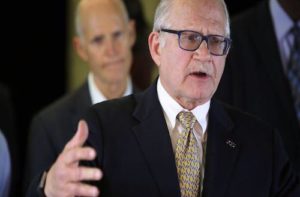Presidents Behaving Badly
January 25, 2022
Inside Higher Ed, Emma Whitford
Mark Rosenberg’s resignation from Florida International is the second high-profile presidential departure this month. Boards appear to be taking evidence of inappropriate behavior more seriously, experts say.
 Days after the University of Michigan Board of Regents very publicly fired Dr. Mark Schlissel for engaging in an inappropriate relationship with a subordinate via email, Mark Rosenberg resigned as president of Florida International University.
Days after the University of Michigan Board of Regents very publicly fired Dr. Mark Schlissel for engaging in an inappropriate relationship with a subordinate via email, Mark Rosenberg resigned as president of Florida International University.
Rosenberg announced his resignation Friday, effective immediately, citing his own health concerns and the deteriorating health of his wife, Rosalie. Two days later, Rosenberg released another statement, writing that he had “caused discomfort for a valued colleague” and, as a result, stepped down.
“I unintentionally created emotional (not physical) entanglement,” Rosenberg wrote in the statement Sunday. “I have apologized. I apologize to you. I take full responsibility and regret my actions.”
Susan Resneck Pierce, a higher education consultant and president emerita of the University of Puget Sound, suspects that Rosenberg’s resignation may have been influenced by Schlissel’s public shaming. The Michigan president was fired after the Board of Regents learned he was having an affair with a subordinate colleague and published 118 pages of messages between them, sent using his university email account.
“The abundance of publicity about and of details surrounding Schlissel’s being let go may have influenced Rosenberg to be proactive,” Pierce wrote in an email.
Rosenberg, who had served as president of Florida International for 13 years, said he disclosed information about the “entanglement” through proper channels. After talking with Dean Colson, the chair of the Board of Trustees, he decided to resign.
Colson also elaborated Sunday on the board’s short response to Rosenberg’s initial resignation announcement.
Rosenberg’s statement “provides insight into why the Board did not believe Friday was the appropriate time to celebrate the many accomplishments of FIU” during Rosenberg’s tenure, Colson wrote. “We are deeply saddened and disappointed by the events requiring his resignation.”
Information about which colleague Rosenberg was referring to, as well as the nature of their communications, has not been disclosed. A spokesperson for Florida International declined to comment on Rosenberg’s resignation and pointed Inside Higher Ed to his Sunday statement.
The New York Times reported Sunday that an investigation into Rosenberg’s misconduct began in mid-December after a female employee told a colleague about the former president’s behavior. The woman reportedly provided text messages between herself and Rosenberg to investigators last week, just before Rosenberg resigned.
While the circumstances are different, Rosenberg’s and Schlissel’s departures both illustrate how much more seriously boards are taking inappropriate behavior, experts say.
“In the atmosphere we’re in now, post–Me Too movement, boards are just much more vigilant,” said Kevin Reilly, president emeritus and regent professor at the University of Wisconsin system. “I think they have to act—and act quickly and decisively—in cases of sexual harassment.”
Before the Me Too movement—which brought about a deeper understanding of sexual misconduct and harassment—presidents and boards may have been more likely to ride out an investigation before deciding the fate of the president. Now, if a president knows they’ve acted inappropriately or violated college policy, they may step down before the issue is aired publicly.
“Often enough, people will have the benefit of the institution and their colleagues and everybody in mind when they think about this,” Reilly said. “They know they made a mistake. I think a lot of people would feel like, ‘Well, all right, I just gotta move on now and let the institution move on beyond me.’”
They may also step down to slow or stop an investigation into their behavior, said Ann Olivarius, a Title IX lawyer who represents individuals who have been harassed. (This paragraph has been updated to clarify Olivarius’s title.)
“Sometimes you avoid putting bad news on record” by stepping down before an investigation is complete, Olivarius said.
Olivarius also noted that misconduct allegations and inappropriate behavior can erode the “moral leadership” of a college president. Brian Mitchell, a former president of Bucknell University and co-author of Leadership Matters, echoed her thoughts.
“These are public jobs,” Mitchell said. “People may make mistakes, but they’re not just a job—they are a job that carries with it a public trust.”
In addition to saving face, there are other reasons why a president might choose to resign—or not—before an investigation into their behavior. The financial agreements tied to their departure, for example, may influence how willing they are to step down. Age may also play a role.
“If you were a younger president or chancellor and you at least believe the facts were in dispute—that people were claiming things about you that were unfair, unjust or didn’t happen—you might be much more likely to go through the process” of an investigation, Reilly said.
Olivarius offered one possible solution for curbing sexual misconduct and inappropriate behavior by higher education officials: fines.
“You start to come for people’s pocketbooks, and all of a sudden maybe having sex is not quite as important,” Olivarius said. “They should have to be charged monetary payments for misconduct or for taking advantage of their power in their situation.”
